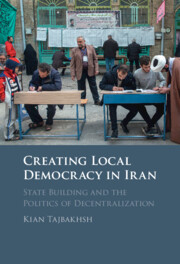Book contents
- Creating Local Democracy in Iran
- Creating Local Democracy in Iran
- Copyright page
- Contents
- Figures
- Tables
- Preface: Stumbling on Local Democracy (My Personal Journey)
- Acknowledgments
- Overview of the Book
- Abbreviations
- Part I Launching Local Democracy
- Part II Arguing for Local Democracy
- Part III Blocking Local Democracy
- 6 The Rocky Path from Elections to Democracy
- 7 City Planning and the Challenges of Democratic Governance
- 8 Financing Local Democracy
- 9 Geopolitics and the Limits of International Municipal Cooperation
- 10 What of the Future of Local Democracy?
- Index
9 - Geopolitics and the Limits of International Municipal Cooperation
from Part III - Blocking Local Democracy
Published online by Cambridge University Press: 07 July 2022
- Creating Local Democracy in Iran
- Creating Local Democracy in Iran
- Copyright page
- Contents
- Figures
- Tables
- Preface: Stumbling on Local Democracy (My Personal Journey)
- Acknowledgments
- Overview of the Book
- Abbreviations
- Part I Launching Local Democracy
- Part II Arguing for Local Democracy
- Part III Blocking Local Democracy
- 6 The Rocky Path from Elections to Democracy
- 7 City Planning and the Challenges of Democratic Governance
- 8 Financing Local Democracy
- 9 Geopolitics and the Limits of International Municipal Cooperation
- 10 What of the Future of Local Democracy?
- Index
Summary
Chapter 9 reviews the attempt by Iranian local government to engage with the international municipal cooperation movement as a way to advance the goal of democratic local government inside Iran and highlights the geopolitical factors that pose sharp limits to that goal. For four years before Iranian security services terminated it, I was co-director of a pioneering “city diplomacy” project involving a multi-year collaboration between mayors and civil society groups from the Netherlands and Iran. The project included exchange visits between Iran and the Netherlands by city councilors, mayors, local civil society groups, and central government officials. It also included collaborative funded neighborhood projects inside Iran. The chapter traces the reasons for the failure of the city diplomacy project to geopolitical factors rooted in Iran’s rejectionist foreign policy and anti-Western and anti-liberal ideology. The international geopolitical factors compounded the antidemocratic ideological commitments of the regime that defeated domestic attempts at reform. Despite its abrupt curtailment, the four-year project made some valuable contributions to the discourse/project/ideal of local democracy in Iran, although its impact on the practice of local democracy is not clear. On the other hand, the Iranian state resolutely moved into the space of international municipal cooperation work in a way that negates and neutralizes democratization and imposed its own terms of Islamization on the interchange with the international community around the theme of urbanization and cities. This shows that the Iranian regime is extremely skilled at managing risk rather than eliminating it.
Keywords
- Type
- Chapter
- Information
- Creating Local Democracy in IranState Building and the Politics of Decentralization, pp. 251 - 285Publisher: Cambridge University PressPrint publication year: 2022



